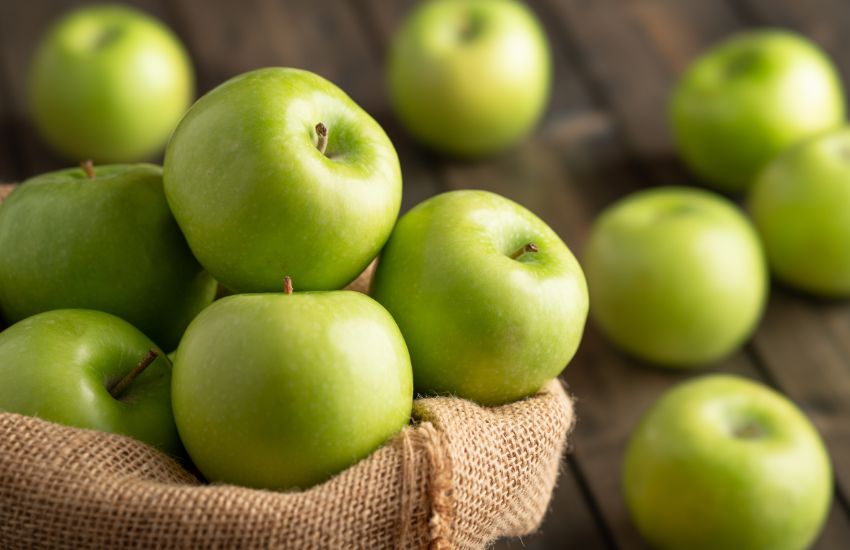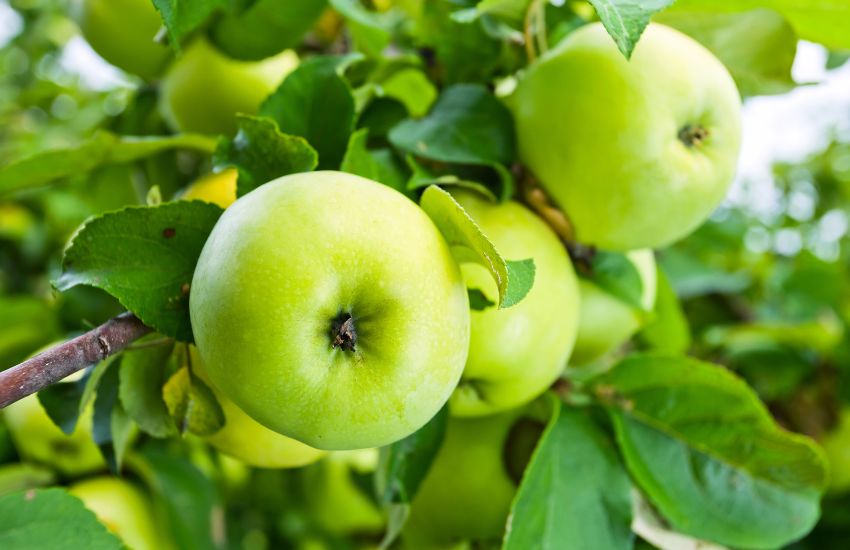You’ve probably heard the saying, “An apple a day keeps the doctor away,” and there’s some truth to it. Apples are packed with various beneficial nutrients that can contribute to your overall health. However, the timing of eating them may play a role in their potential benefits.
The phrase’s origin dates back to the late 1800s, with the advice being to “Eat an apple on going to bed, and you’ll keep the doctor from earning his bread.” This suggests that consuming an apple before bedtime was recommended for optimal health benefits.
Apples are a nutritional powerhouse, containing essential nutrients such as fiber, calcium, magnesium, potassium, vitamin C, vitamin B6, vitamin A, vitamin E, folate, carotene, and vitamin K. These nutrients contribute to various aspects of your well-being (according to the U.S. Department of Agriculture’s Agricultural Research Service).
One interesting fact about apples is that their natural sugar, fructose, provides a gentle energy boost without causing jitteriness, as highlighted by the International Food Information Council Foundation.
Considering all these positive attributes, you may wonder if any drawbacks are associated with eating apples at night.
Nutritional composition of apples
Scientifically known as Malus domestica, apples are delicious and nutritious fruits from a flowering tree. Packed with a variety of essential nutrients, they offer numerous Green Apples health benefits. Apples are rich in carbohydrates, fiber, antioxidants, vitamins, and minerals.
Specific components found in apples, such as melatonin, potassium, and carbohydrates, can influence sleep quality. Melatonin is a hormone that regulates sleep-wake cycles and may contribute to better sleep.

In a 100-gram serving of raw and unpeeled apples, you can find the following nutritional values:
- Calories: 52
- Carbohydrates: 13.8 grams
- Fiber: 2.4 grams
- Protein: 0.3 grams
- Fat: 0.2 grams
- Vitamin C: 8% of the recommended daily intake
- Potassium: 3% of the recommended daily intake
- Magnesium: 1% of the recommended daily intake
Additionally, apples contain melatonin, which can positively impact sleep.
Benefits of eating apples before bed
Carbohydrates
Consuming carbohydrates can affect the quality of sleep. One study discovered that consuming a meal rich in carbohydrates with a high glycemic index (GI) before bedtime can increase levels of tryptophan, which in turn raises melatonin and serotonin. These hormones are known to facilitate the onset of sleep. However, other studies have conflicting results regarding the impact of high GI meals on rest. Some studies suggest that high GI meals do not affect sleep, while others report disturbances in sleep patterns. High GI foods, particularly those containing simple sugars like sugar-sweetened beverages and sweets, are associated with poorer sleep quality due to their ability to cause rapid increases in blood sugar levels. It remains unclear whether diet affects sleep or if poor sleep quality leads to increased consumption of high GI carbohydrates.
In a study involving 3,129 female workers aged 34-65, participants with higher intakes of low-quality carbohydrates skipped breakfast, ate irregularly, consumed energy drinks, and had lower consumption of fish and vegetables reported poorer sleep quality. However, further research is required to fully understand the relationship between carbohydrates and sleep.
On the other hand, apples are a great source of fiber and are considered low GI carbs, meaning they cause minimal spikes in blood sugar levels. One study indicated that insomnia decreased when post-menopausal women switched from consuming high-GI foods to low-GI foods. Therefore, apples may positively impact sleep, or at the very least, they should not cause or worsen sleep troubles.
Melatonin
Melatonin plays a crucial role in promoting a good night’s sleep. The brain naturally produces melatonin as darkness sets in, helping to relax the body and induce sleepiness. Melatonin can also be obtained through dietary sources and supplementation.
The presence of melatonin in apples was first reported in 2013. Research has shown significant variation in melatonin content among different apple varieties, ranging from approximately 0.86 nanograms (ng) per gram to 148.11 ng per gram of flesh and peel. Granny Smith apples have lower melatonin levels at 8.37-17.18 ng per gram, while Jincui apples contain higher levels ranging from 87.28-105.97 ng per gram.
To put this into perspective, the typical recommended dosage of a melatonin supplement is 1-5 mg. Consuming a 3-ounce (100-gram) portion of a Jincui apple would provide approximately 0.6 mg ofatonin. Therefore, the amount of melatonin present in apples is unlikely to be to induce sleepiness.
Vitamin C
Apples contain approximately 8% of the recommended daily value (DV) of vitamin C in a 3-ounce (100-gram) portion. Vitamin C is an antioxidant that supports overall health by combating free radicals in the body, which can cause cell damage when present in excessive amounts.
Research suggests that inflammation and oxidative stress, which may occur when free radicals are imbalanced, can negatively affect sleep duration. A study involving healthy adults aged 20 years and older found that individuals with ideal levels of vitamin C had lower levels of inflammation and oxidative stress. They were also more likely to report a sufficient sleep duration of 7-8 hours. Therefore, regular consumption of apples may promote better sleep quality.
Potassium
Apples contain small amounts of potassium, a mineral that may play a role in daytime sleepiness when levels are irregular. However, most research on the effects of potassium on sleep needs to be updated, and more recent studies are necessary to confirm these effects.
An older study in 1991 examined the impact of potassium supplementation on sleep quality in healthy young males aged 18-33 who followed a low-potassium diet. The results showed that a daily intake of 96 milliequivalents of potassium for one week improved sleep efficiency. However, if an individual already consumes a diet high in potassium, supplementation may not provide additional benefits for sleep quality. Overall, the effects of potassium supplementation on sleep remain unclear and require further investigation.
Nevertheless, the quantity of potassium in apples is not significant. A 3-ounce (100-gram) portion contains only 3% of the recommended DV, while bananas contain 10% of the recommended DV. Therefore, the potassium levels in apples may not be sufficient to aid with sleep.
SUMMARY
Apples contain various nutrients that could contribute to a good night’s sleep. However, the amounts of these nutrients found in apples are not significant enough to substantially impact sleep promotion. Consequently, while apples are unlikely to actively promote sleep, they should not hinder one’s ability to sleep either.
Should you eat apples before going to bed?
Apples are an excellent source of nutrients and fiber, making them valuable to your daily diet. However, some suggest avoiding this fruit in the evening due to its potential to disrupt sleep, as reported by The Sun. The recommended time to consume an apple is in the morning, as it can aid digestion throughout the day. The pectin found in apples helps stimulate bile production in the liver, facilitating efficient digestion. The Sun advises eating an apple before breakfast to optimize this benefit.

It is important to note that the claim made by The Sun lacks scientific evidence. If eating an apple in the evening does not cause any digestive discomfort for you personally, there is no need to avoid it. According to the University of Illinois Extension, apples contain soluble and insoluble fiber, making them an excellent choice for an evening snack as they promote efficient food movement through the digestive system. Remember to consume the peel to obtain all the fiber and nutrients.
Harvard Medical School recommends avoiding large meals 2-3 hours before bedtime. Instead, opt for a small, nutritious snack such as an apple and a slice of cheese to satisfy hunger until breakfast.
Potential Drawbacks of Consuming Apples Before Bed
Consuming food before bed may disrupt your natural circadian rhythm, potentially negatively affecting your health. Studies indicate that eating late at night can increase the risk of obesity and cardiometabolic diseases, including diabetes, high blood pressure, and high cholesterol levels.
A study on moderate-weight women compared the impact of consuming a 200-calorie snack at different times of the day. The results revealed that those who ate the snack late at night (11 p.m.) experienced a slight decrease in fat-burning capacity and increased total cholesterol levels.
However, it is essential to note that research findings on this topic could be more consistent, as some studies have found no significant differences when consuming small meals at night.
While consuming higher quality, lower glycemic index (GI) foods like apples before bedtime may promote better sleep, further research is required to establish a definitive connection.
Recommendations
Apples are a nutritious fruit that can potentially contribute to a good night’s sleep due to their content of various beneficial nutrients. Here are some practical tips to consider:
- Create a delicious salad combining different fruits, such as apples, grapefruit, and bananas. This way, you can incorporate additional potassium and vitamin C sources into your diet before bedtime.
- If you experience mild hunger pangs before bed, reach for an apple. Apples are great for a low glycemic index (GI) snack. Low-GI foods like apples can help regulate blood sugar levels and promote better sleep quality.
In summary, while apples may not contain significant sleep-inducing nutrients, they are still a health-promoting food that can be included in a balanced and nutritious diet.
When is the best time to eat apples?
The morning is considered the best time to enjoy apples due to their high pectin content, which offers numerous benefits for the intestines. Pectin is known for supporting optimal intestinal function and preventing constipation.

Apples can also serve as a nutritious snack when you experience slight hunger, aiding blood sugar regulation. It is important to note that consuming apple peel is highly recommended as it contains many nutrients that contribute to overall health.
In summary, apples are delicious and packed with essential nutrients. However, timing plays a role in maximizing their benefits. While eating an apple before bed may assist with sleep, current evidence cannot draw definitive conclusions. Therefore, avoiding consuming apples before bedtime unless necessary, such as when experiencing hunger pangs, is advisable.
The bottom line
Emerging research suggests that apples contain melatonin, a hormone that promotes feelings of calmness and aids in falling asleep. However, the melatonin content in apples is relatively low, making it unlikely to significantly impact inducing sleep.
Nevertheless, apples can still be beneficial for sleep because they are a quality source of carbohydrates and are low glycemic index (GI) food. Consuming apples before bed may reduce the time it takes to transition into a deep sleep.
Some claim eating late at night could increase the risk of obesity and cardiometabolic diseases. However, conflicting research findings make it unclear whether consuming apples before bed would contribute to the development of these conditions.
In summary, no definitive scientific evidence supports or refutes the idea that eating an apple before bed directly promotes sound sleep. Apples neither actively encourage nor inhibit sleep. Therefore, if you feel like enjoying an apple before bedtime, there is no harm in doing so.
FAQs
Is green apple good for weight loss at night?
Yes, green apples do aid in weight loss. Green apples can benefit weight loss, primarily due to their high fiber content. Fiber helps promote a feeling of fullness, keeping you satisfied for longer. Feeling satiated makes you less likely to indulge in unhealthy snacks, thereby supporting your weight loss goals.
What are the benefits of eating green apples?
Green Apple Health Benefits
- Promotes Healthy Digestion. Green apples are an excellent dietary fiber source, essential for healthy digestion.
- Reduces The Risk Of Chronic Diseases.
- Improves Heart Health.
- Boosts Immune System.
- Promotes Healthy Skin.
- Supports Healthy Weight Management.
Does green apple burn belly fat?
Fresh and crunchy apples are delicious and contain an abundance of healthy flavonoids and fibers that may aid in burning belly fat. These fruits are particularly rich in pectin fiber, known for their slow breakdown in the body. The Apple fiber promotes a feeling of satiety, helping curb cravings and support weight management goals.
When should I eat green apples?
To reap the full range of health benefits from green apples, consuming them early in the morning on an empty stomach is recommended. However, you can also enjoy green apples at other times of the day based on your preference and convenience.
It is generally safe to consume 2-3 apples per day. However, individuals with diabetes or those following special diets should consult their dietician or doctor before significantly changing their apple intake. This ensures that it aligns with their dietary needs and overall health condition.
Are green apples better than coffee?
An apple can provide more energy than coffee, albeit derived from sugar rather than caffeine. Moreover, consuming these fruits in the morning can offer additional benefits such as aiding weight loss, reducing the risk of heart disease, and supporting gut health.
Is a green apple better than a banana?
When it comes to nutrition, bananas, and apples share many similarities. However, bananas have a slight advantage in vitamins and minerals, while apples provide a higher fiber content.
Do green apples have caffeine?
Apples, contrary to popular belief, do not contain caffeine. However, they can still boost energy due to their high sugar content. The apple fiber ensures this energy boost lasts longer than sugary snacks like candy bars.

